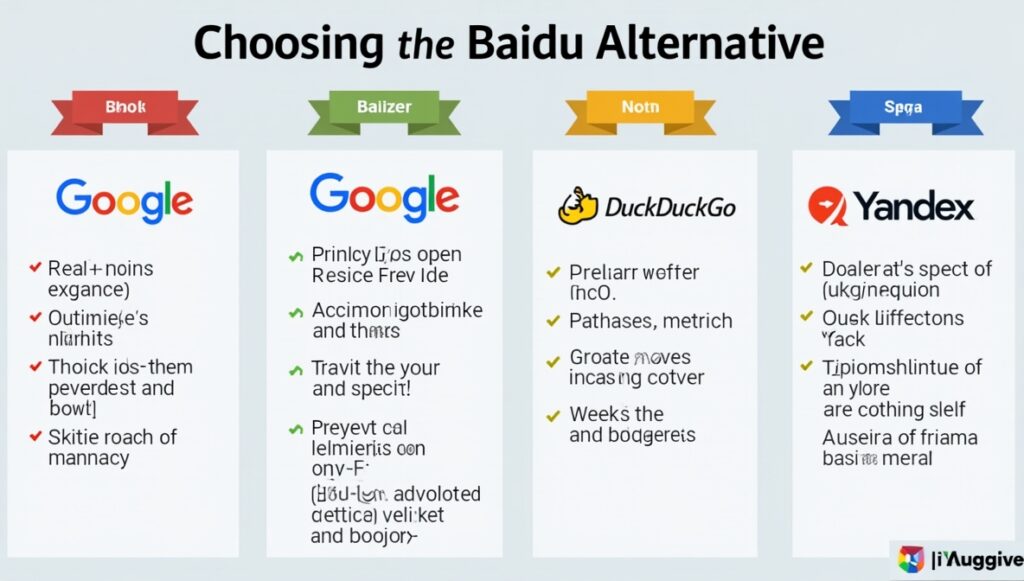
In today’s digital world, search engines play a crucial role in connecting users with information, products, and services. While Google dominates the global search engine market, Baidu holds a significant share in China, making it a powerful tool for reaching Chinese users. However, businesses and individuals looking for alternatives to Baidu, either for diverse markets or specific needs, may be exploring other options. If you’re searching for a Baidu alternative, this article will walk you through several effective solutions and explain why they may be the right fit for your digital strategy.
At Dust Digital Marketing Ltd., we understand the importance of leveraging the best tools to maximize your digital presence. Whether you are operating in China or globally, the right search engine can drive your website traffic, increase your visibility, and help you connect with your audience. In this article, we will explore top Baidu alternatives, their features, and how to determine which search engine is best suited to your business needs.
What is Baidu?
Baidu is the dominant search engine in China, often referred to as the “Google of China.” It was founded in 2000 and has grown to serve millions of users daily, catering primarily to the Chinese-speaking population. While Baidu is an excellent choice for businesses aiming to target users within China, there are situations where other search engines might be more appropriate depending on your target market.
Why Consider Baidu Alternatives?

Although Baidu is a robust search engine, it may not always meet the needs of global businesses or those looking for more diverse markets. Here are some reasons to explore Baidu alternatives:
- Market Reach: Baidu is predominantly focused on China and may not provide the global reach that platforms like Google or Bing offer.
- User Experience: Some users find Baidu’s interface cluttered and its search results less intuitive than alternatives.
- SEO Strategies: For businesses targeting non-Chinese markets, optimizing your content for Baidu may not be effective if your audience is located outside China.
Let’s explore some of the most popular Baidu alternatives that can help expand your digital footprint.
Top Baidu Alternatives
1. Google Search
Google is the undisputed leader in the global search engine market, dominating over 90% of the search engine share worldwide. If you’re targeting international customers, Google is an essential platform to consider.
- Why Use Google: Google offers a simple, fast, and efficient search experience. With extensive features such as Google Ads, Google Analytics, and YouTube, businesses can effectively reach customers in almost every country.
- Best For: Businesses targeting international markets or looking to dominate global SEO rankings.
2. Bing
Bing, owned by Microsoft, is another major search engine that offers significant potential, particularly in North America and Europe. While Bing doesn’t have the same global market share as Google, it remains a solid choice for businesses looking to diversify their search engine strategy.
- Why Use Bing: Bing provides robust SEO tools, including Bing Webmaster Tools and Bing Ads. It’s also the default search engine for Microsoft’s Edge browser and is integrated into Windows, making it an attractive option for many users.
- Best For: Businesses targeting users in North America and Europe, or those looking to complement their Google SEO efforts.
3. Yahoo
While Yahoo’s search engine is powered by Bing, it has its own set of features that attract users, particularly in Japan and other parts of Asia. Yahoo still holds a strong position in some regional markets and remains an important search engine.
- Why Use Yahoo: Yahoo offers various services like Yahoo News, Yahoo Finance, and Yahoo Mail, which make it a good platform for engaging with users on multiple fronts.
- Best For: Companies looking to target users in Japan and specific regional markets in Asia.
4. Yandex
Yandex is Russia’s leading search engine, serving over 60% of the Russian market. It also has a growing presence in countries of the former Soviet Union and Eastern Europe. Yandex offers a range of digital marketing tools and a highly advanced search algorithm.
- Why Use Yandex: Yandex offers excellent localization features, making it the go-to platform for businesses looking to reach Russian and Eastern European users. Yandex Ads and Yandex Analytics provide solid support for digital marketers.
- Best For: Businesses targeting Russian-speaking users and markets in Eastern Europe.
5. DuckDuckGo
For users concerned about privacy, DuckDuckGo is the go-to search engine. DuckDuckGo promises to never track users or sell their data, making it a favorite among privacy-conscious individuals.
- Why Use DuckDuckGo: DuckDuckGo emphasizes privacy, making it ideal for users who are looking for an alternative to search engines that track personal data.
- Best For: Businesses targeting privacy-conscious users or those looking for ethical alternatives to Google or Baidu.
6. Ecosia
Ecosia is a search engine that uses the revenue from its searches to plant trees. With a growing user base, Ecosia has become popular among environmentally-conscious users.
- Why Use Ecosia: If your brand has a sustainability or environmental focus, advertising through Ecosia can be a good way to align your marketing with your corporate values.
- Best For: Businesses with an environmental or sustainability focus looking to engage a conscious consumer base.
7. Naver
Naver is the leading search engine in South Korea, often compared to Google for its dominance in the market. Naver integrates various services such as news, blogs, and a shopping platform, providing a rich experience for users.
- Why Use Naver: Naver’s search results are highly integrated with other services, making it a powerful platform for businesses looking to engage with South Korean consumers.
- Best For: Companies targeting South Korea and looking for integrated digital marketing tools.
Comparison Table: Baidu Alternatives
Here’s a quick comparison table to help you decide which Baidu alternative is best for your business needs:
| Search Engine | Target Market | Key Features | Best For |
|---|---|---|---|
| Global | Google Ads, Google Analytics, YouTube integration | International businesses and global SEO | |
| Bing | North America, Europe | Bing Ads, Bing Webmaster Tools | North American and European markets |
| Yahoo | Japan, Asia | Yahoo News, Yahoo Finance, Yahoo Mail | Businesses targeting Japan and regional Asia |
| Yandex | Russia, Eastern Europe | Yandex Ads, Yandex Analytics, Localization features | Russian and Eastern European markets |
| DuckDuckGo | Global | Privacy-focused search engine | Privacy-conscious consumers |
| Ecosia | Global | Tree-planting initiative, eco-friendly brand | Environmentally-conscious consumers |
| Naver | South Korea | Integrated services (news, blogs, shopping) | South Korean market and integrated marketing |
Q&A: Baidu Alternative
Q1: Why should I consider switching from Baidu to another search engine? If your business is targeting global or non-Chinese markets, other search engines like Google, Bing, or Yandex may provide a broader reach and more effective digital marketing tools. Additionally, if you’re facing challenges with Baidu’s user interface or SEO optimization, switching to another platform could offer more user-friendly options.
Q2: Is Google the best alternative to Baidu? Google is the dominant search engine worldwide and is an excellent choice for businesses targeting international audiences. However, depending on your target market (e.g., Russia or South Korea), other platforms like Yandex or Naver may be more effective.
Q3: Can I use multiple search engines in my digital marketing strategy? Yes, it’s highly recommended to diversify your strategy across multiple search engines. Each search engine has its unique audience, and by advertising on different platforms, you can reach a broader range of potential customers.
Q4: What are the SEO differences between Baidu and its alternatives? Baidu has a unique algorithm tailored to Chinese users, which might not align with SEO practices in other countries. For example, Google prioritizes backlinks and content quality, while Baidu emphasizes keyword density and the use of specific Chinese websites for backlinks. Each search engine has different optimization techniques, so it’s essential to adjust your SEO strategy accordingly.
Q5: How can I optimize for Yandex or Naver? For Yandex, focus on localized content, proper keyword targeting, and high-quality backlinks. Naver requires integration with its services, such as Naver Blog or Naver Cafe, so creating content that is native to their ecosystem is essential for visibility.
Conclusion

Choosing the right Baidu alternative depends on your business goals, target audience, and specific digital marketing needs. Whether you are targeting global markets with Google, focusing on privacy-conscious consumers with DuckDuckGo, or engaging local audiences in Russia with Yandex, there are many options to explore. By understanding the strengths and features of these search engines, you can make informed decisions to enhance your online presence and drive meaningful traffic to your website.
At Dust Digital Marketing Ltd., we specialize in helping businesses navigate the complexities of digital marketing, including SEO and search engine optimization. If you’re looking to optimize your website for global or regional search engines, contact us at dusthk.com to learn more about how we can help you achieve your digital marketing goals.
Contact information of Dust Digital Marketing Ltd.
- Website: https://www.dusthk.com
- Email: stan@dustseo.com
- Phone: +852 3575 0844
- WhatsApp: +852 6739 8296
- Address: Unit B, 12th Floor, Hang Seng Causeway Bay Building, 28 Yee Wo Street, Causeway Bay, Hong Kong

